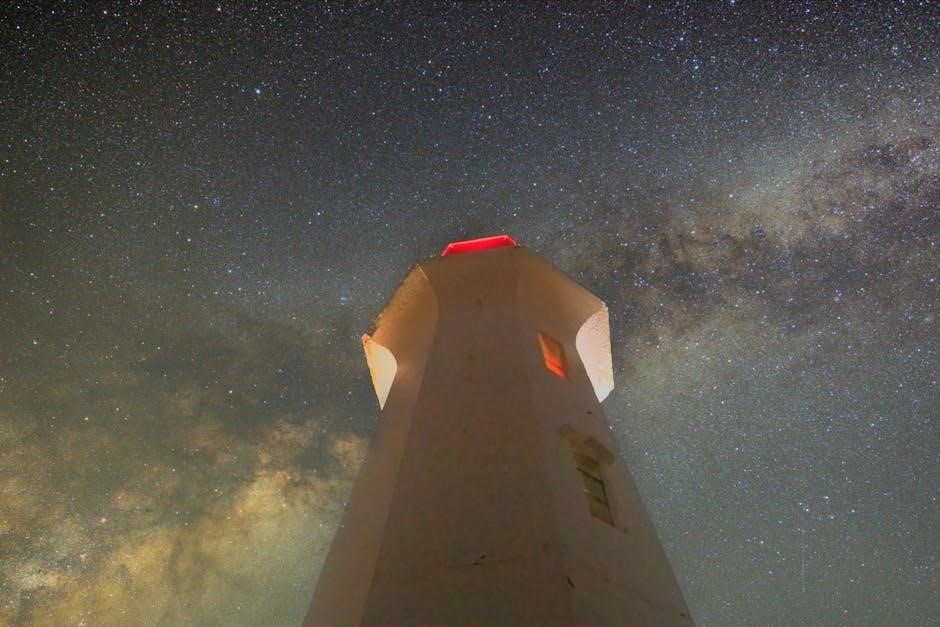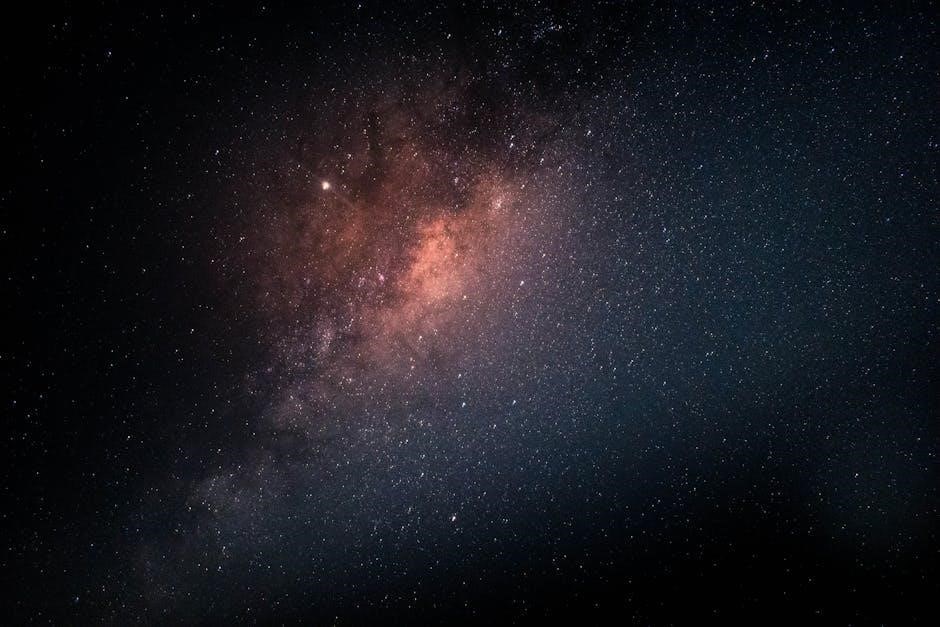The Hitchhiker’s Guide to the Galaxy is a cult classic, blending humor and philosophical themes. With over 15 million copies sold, it’s a beloved science fiction satire.
1.1 Overview of the Series
The Hitchhiker’s Guide to the Galaxy is a comedic science fiction series by Douglas Adams, blending humor, satire, and philosophical themes. It follows the misadventures of Arthur Dent and his alien friend Ford Prefect as they travel through space. The series includes five novels, radio dramas, and adaptations, becoming a cult classic with over 15 million copies sold worldwide, earning Hugo and Locus Awards.
1.2 The Concept of the Guide
The Hitchhiker’s Guide to the Galaxy is a fictional guidebook central to the series. It offers advice for intergalactic travelers, emphasizing the infinite complexity of the universe. The guide’s entries, filled with dry wit, reflect the series’ themes of absurdity and satire, making it a symbol of both utility and existential humor in the face of cosmic uncertainty and human insignificance.
The Author: Douglas Adams
Douglas Adams was an English author and screenwriter, best known for The Hitchhiker’s Guide to the Galaxy. His unique blend of humor and intellect captivated millions.
2.1 Biography of Douglas Adams
Douglas Adams, born on March 11, 1952, was a renowned English author and screenwriter. He gained fame through his work on The Hitchhiker’s Guide to the Galaxy, which began as a radio series. Adams’ unique wit and imaginative storytelling left a lasting impact on science fiction and comedy. His legacy continues to inspire fans worldwide.
2.2 His Role in Shaping the Series
Douglas Adams was the creative force behind The Hitchhiker’s Guide to the Galaxy. His humor, wit, and imaginative storytelling defined the series; The idea emerged in 1971 while he was in Austria, evolving from a radio series into novels. Adams’ unique vision and versatility expanded the series into TV, film, and stage productions, ensuring its enduring legacy in science fiction and comedy.

The Radio Series
The Hitchhiker’s Guide to the Galaxy originated as a radio series, with its Primary Phase introducing key episodes that laid the foundation for its cult status and subsequent adaptations.
3.1 The Primary Phase
The Primary Phase of The Hitchhiker’s Guide to the Galaxy radio series, first broadcast in 1978, introduces the core storyline and characters. Episode 1: Fit the First sets the tone with Arthur Dent’s house demolition and his escape from Earth’s destruction. Episodes like ‘You’ve Got to Build Bypasses’ and ‘A Strange Coincidence’ explore absurdity and satire. This phase laid the groundwork for the series’ cult success.
3.2 Key Episodes and Their Significance
Key episodes in the Primary Phase, like “Fit the First” and “You’ve Got to Build Bypasses,” introduce Arthur Dent’s journey and the demolition of Earth. These episodes establish the series’ blend of humor and existential themes. “A Strange Coincidence” and “Six Pints of Bitter” delve into absurdity, showcasing the series’ unique tone. They collectively set the foundation for the franchise’s enduring popularity and cultural impact.
Literary Works in the Series
The Hitchhiker’s Guide to the Galaxy series includes five novels by Douglas Adams, known for their humor and philosophical themes. Over 15 million copies sold worldwide.
4.1 The Hitchhiker’s Guide to the Galaxy (1979)
First in the series, this novel introduces Arthur Dent, Ford Prefect, and their misadventures after Earth’s destruction. Douglas Adams’ witty blend of humor and philosophy captivates readers, exploring themes of existence and technology. The book became a cult classic, praised for its unique storytelling and satirical take on science fiction, solidifying its place as a timeless bestseller.
4.2 The Restaurant at the End of the Universe (1980)
The second book in the series, “The Restaurant at the End of the Universe,” expands the cosmic adventures of Arthur Dent and his companions. It introduces Zaphod Beeblebrox, the two-headed president, and Marvin, the depressed android. The story delves into themes of existence, time travel, and absurdity, showcasing Adams’ mastery of blending humor with profound philosophical questions about the universe and humanity’s place within it.
4.3 Life, the Universe and Everything (1982)
The third installment, “Life, the Universe and Everything,” sees the return of Arthur Dent and his companions as they encounter the enigmatic Krikkiters and their sinister motives. The book explores themes of existence, the search for meaning, and the power of imagination. It introduces the supercomputer Deep Thought and delves into the origins of the universe, blending humor with philosophical musings in classic Adams style.
4.4 So Long, and Thanks for All the Fish (1984)
In this fourth book, Arthur Dent returns to Earth, only to discover it has been rebuilt. The story delves into humanity’s origins and the enigmatic dolphins, who left Earth with a cryptic message. Humor intertwines with existential themes as Arthur grapples with love, home, and the meaning of life, offering a fresh perspective on the human condition.
4.5 Mostly Harmless (1992)
The fifth book in the series, Mostly Harmless, continues the misadventures of Arthur Dent and Ford Prefect. It introduces Trillian’s daughter, Random, and explores themes of parenthood and cosmic chaos. This installment is darker, delving into existential despair, yet retains Adams’ signature wit. It concludes the series with a poignant reflection on the search for meaning in an indifferent universe.

Notable Editions and Releases
The series includes special editions like the Ultimate Hitchhiker’s Guide, featuring all five novels, and an illustrated edition, enhancing the storytelling with visual art.
5.1 The Ultimate Hitchhiker’s Guide to the Galaxy
The Ultimate Hitchhiker’s Guide to the Galaxy is a comprehensive collection, including all five novels and bonus material. Published by Pan Macmillan, it offers fans a complete journey through Adams’ cosmic universe, blending humor and philosophy, making it a must-have for enthusiasts of the series.
5.2 Illustrated and Special Editions
The Hitchhiker’s Guide to the Galaxy is available in an illustrated edition, offering visual charm to the beloved story. This special release enhances the narrative with stunning visuals, making it a collector’s treasure. Priced at 1154 rubles, it remains a popular choice for fans seeking a unique reading experience in English.
Themes and Motifs
Blending science fiction with satire, the series explores absurdity, existential themes, and the human condition, often mocking technology and bureaucracy through humor and philosophical insights.
6.1 Science Fiction and Satire
The Hitchhiker’s Guide to the Galaxy blends science fiction with satire, using humor to critique societal norms, politics, and technology. It employs absurdity and clever plot devices to explore deeper philosophical themes, making it a cult classic with over 15 million copies sold and numerous adaptations.
6.2 The Absurdity of Life and the Universe
The series explores the absurdity of life through humor and irony, often highlighting the meaninglessness of existence. The universe is portrayed as indifferent, with characters like Marvin embodying existential despair. Themes of randomness and illogic are central, reflecting the futility of seeking ultimate answers in an indifferent cosmos.
Cultural Impact and Legacy
The Hitchhiker’s Guide to the Galaxy has inspired a massive fan base, pop culture references, and won prestigious awards like Hugo and Locus, cementing its legacy.
7.1 Fan Base and Pop Culture References
The Hitchhiker’s Guide to the Galaxy boasts a dedicated fan base, inspiring countless pop culture references. Its witty humor and unique concepts have influenced films, TV shows, and literature. The series’ iconic phrases, like “Don’t Panic!” and “42,” have become ingrained in popular culture, reflecting its enduring appeal and creative brilliance.
7.2 Influence on Other Works
The Hitchhiker’s Guide to the Galaxy has significantly influenced science fiction and comedy. Its unique blend of humor and philosophy has inspired authors, TV shows, and films. The series’ creative themes and satire have become a benchmark for many works, showcasing its lasting impact on popular culture and storytelling.
Adaptations and Media
The Hitchhiker’s Guide to the Galaxy has been adapted into television series, films, stage productions, and audio dramas, each capturing its unique humor and charm.
8.1 Television and Film Adaptations
The Hitchhiker’s Guide to the Galaxy has been adapted into a television series and a feature film, both capturing its quirky humor and sci-fi essence. The 2005 film, directed by Garth Jennings, starred Martin Freeman as Arthur Dent and Zooey Deschanel as Trillian, bringing the story to a wider audience while staying true to its satirical roots.
8.2 Stage Productions and Audio Dramas
The Hitchhiker’s Guide to the Galaxy has been adapted into successful stage productions, capturing its humor and complexity. Audio dramas, including the original radio series, have also been popular, featuring the Primary Phase episodes like “Fit the First” and “You’ve Got to Build Bypasses.” These adaptations remain faithful to Douglas Adams’ vision, blending wit and cosmic absurdity for audiences worldwide.

The Guide Itself
The Hitchhiker’s Guide to the Galaxy is a fictional guidebook central to the series, offering humorous and satirical insights into the universe. Its structure as a comprehensive boxset includes five novels, blending science fiction and comedy, making it a beloved and iconic element of the franchise.
9.1 Structure and Content
The Complete Hitchhiker’s Guide to the Galaxy is structured as a boxset containing five novels, blending humor with philosophical themes. It includes The Hitchhiker’s Guide to the Galaxy, The Restaurant at the End of the Universe, and others, offering satirical insights into the universe. Its content mixes absurdity with practical advice, making it a cult classic and a timeless blend of science fiction and comedy.
9.2 Notable Entries and Their Humor
The guide features humorous entries like Earth being labeled “harmless” and the Infinite Improbability Drive. These entries blend absurdity with witty observations, reflecting the series’ satirical take on life and the universe. The humor often stems from the guide’s deadpan delivery, making even the most bizarre concepts seem oddly relatable and hilariously plausible.

Awards and Recognition
The Hitchhiker’s Guide to the Galaxy has won prestigious Hugo and Locus Awards, acclaiming its blend of humor and science fiction. Its influence is undeniable;
10.1 Hugo and Locus Awards
The Hitchhiker’s Guide to the Galaxy earned Hugo and Locus Awards, recognizing its unique blend of science fiction and satire. These accolades highlight its impact on literature and popular culture, solidifying its status as a cult classic and a must-read in the genre. Its creative storytelling continues to captivate audiences globally, ensuring its lasting legacy.
10.2 Sales and Commercial Success
The Hitchhiker’s Guide to the Galaxy has achieved remarkable sales, with over 15 million copies sold worldwide. Its popularity led to various editions, including the Ultimate Hitchhiker’s Guide, further boosting its commercial success. The series’ global appeal continues to drive sales, making it a cornerstone of science fiction literature and a testament to its enduring popularity and cultural influence.
The Hitchhiker’s Guide to the Galaxy remains a timeless blend of humor, philosophy, and science fiction, captivating audiences with its unique perspective on life and the universe.
11.1 The Timeless Appeal of the Series
The Hitchhiker’s Guide to the Galaxy endures as a beloved blend of humor, philosophy, and science fiction. Its satirical take on life’s absurdities and universal themes resonates across generations, making it a cultural staple. The series’ ability to balance wit with deep existential questions ensures its relevance, captivating readers and inspiring countless adaptations and devoted fan communities worldwide.
11.2 Its Relevance in Modern Times
The Hitchhiker’s Guide to the Galaxy remains remarkably relevant today, offering timeless commentary on technology, society, and existential questions. Its blend of humor and philosophy continues to resonate, appealing to new generations. The series’ exploration of universal themes ensures its enduring popularity, making it a cornerstone of modern pop culture and a testament to its lasting influence on literature and media.